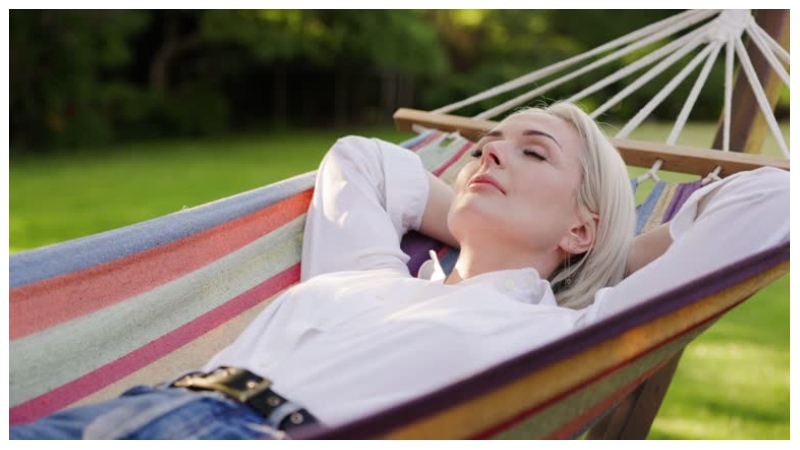Numerous individuals find they sleep better at night after spending time outside. It may be walking through a park, working in the yard, or just basking in the sun, and the activities appear to wind down the body and the soul at bedtime. It’s more than tired muscles. Time spent outside gives us exposure to natural light, fresh air, and gentle exercise that puts your body on the pulses of your natural cycles. Fresh air and sunlight provide messages to your brain on when it should be wakeful and when it should wind down to rest.
Exercise reduces stress, and nature quiets the intellect. Together, they provide the circumstances under which your body will rest more profoundly and more restoratively. In this article, we will consider natural light influences, body exercise, stress reduction, fresh air, hormone balance, and the general results that contribute to outdoor days being the ideal prescription for sound sleeping at night.
Natural light effects
Time outside during the day enables your body to learn what is and isn’t sleeping time. Sunshine outdoors is much stronger than light indoors, and this light resets your inner clock, or your body’s circadian rhythm. When your body sees sunlight in the morning or afternoon, your body releases messages that wake up your body and you feel more alert.
When the sun falls in the west in the evening, your body winds down and releases your body’s sleeping hormone, melatonin. This rhythm works best if your body experiences outdoor light on a daily basis. When it does not, your body becomes confused with light indoors and screen time, and it is hard sleeping at night. Even minimal exposure outdoors can be apparent in how alert and refreshed your body will be once it has slept.
Body movement role
One reason being outdoors helps sleep is the natural movement it encourages. Walking, gardening, or playing outside uses up energy in a steady and healthy way. This physical activity not only makes you pleasantly tired but also improves blood circulation and reduces stress. When paired with sunlight and fresh air, the effect becomes even stronger.
- Walking in nature lowers tension and anxiety.
- Gardening combines movement with mindfulness.
- Outdoor play or sports adds fun while tiring the body naturally.
According to Legacy Healing Center, engaging in consistent physical activity outdoors supports healthier sleep cycles and helps the body regulate energy levels. Even light exercise outside, such as stretching or a short stroll, signals to your body that it is active in the day, which makes rest come easier at night. By making movement a part of your outdoor routine, you are giving your body the perfect balance of activity and recovery, which is key to enjoying deeper and more restful sleep.
Common sleep questions
People are curious why spending time outdoors makes such a difference for sleeping. A common query is how long outdoors suffices to make a difference. Studies indicate that even 20 to 30 minutes of outdoor light exposure on a daily basis assists in adjusting your body’s circadian rhythm and enhances your ability to sleep better. The more regular your habit, the better your outcomes. People also want to know if outdoor exercise at whatever hour of the day has an equal effect.
Light exposure during morning and early afternoon works best in telling your body to be awake throughout the day and ready for sound sleeping at night. Light exposure in the evening, particularly through devices, disrupts your melatonin production and makes it difficult to fall asleep. It makes sense if you understand and make more intelligent choices regarding your everyday regimen. By paying attention to what hour and how long you are outdoors, your body receives the natural signals it requires.
Quick tips for better rest
Outdoor time is not the only factor in restful nights, but it is one of the most natural and effective. Pairing time outside with simple habits can make the results even stronger.
- Take short walks outdoors during lunch breaks
- Keep your bedroom cool and comfortable
- Reduce screen use one hour before bed
- Practice calming activities like reading or stretching
- Aim for a consistent bedtime and wake-up schedule
These small steps, combined with daily exposure to natural light, work together to restore your sleep cycles and improve overall well-being.
Real-life experience of change
Small-scale studies on working adults who spent vast portions of their days indoors revealed an interesting trend. When subjects were asked to add just one hour of outdoor activity to their regimen, they improved in their sleeping within two weeks. They went to bed earlier, woke up fewer times during the night, and woke up feeling fresher. This wasn’t through intense exercise but just walking, gardening, or sitting outdoors during daytime.
One respondent indicated previously having difficulty being awake in the office and feeling fatigued all the time. When they added the regimen, they enhanced sleeping besides experiencing enhanced concentration and reduced stress. Experts believe natural light has the ability to reset the body’s circadian rhythm and balance the production of melatonin, hence inducing deeper and more restorative sleeping.
72 percent of participants also indicated longer, uninterrupted sleep with more time spent outdoors.
This illustration depicts how inexpensive, simple things such as spending time outdoors can really affect the quality of your rest, all without extreme alterations in lifestyle.
Take your first step outside
If you want to understand why you sleep better after a day outside, the best way is to try it yourself. Start small by adding daily moments outdoors, whether it is a short walk or enjoying fresh air during breaks. Over time, these habits help regulate your natural rhythms, reduce stress, and prepare your body for deeper rest. Better nights often begin with brighter days spent outdoors.
